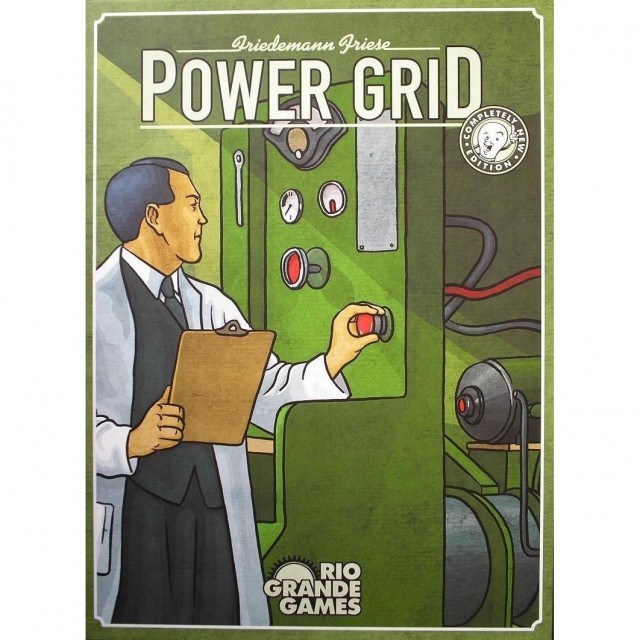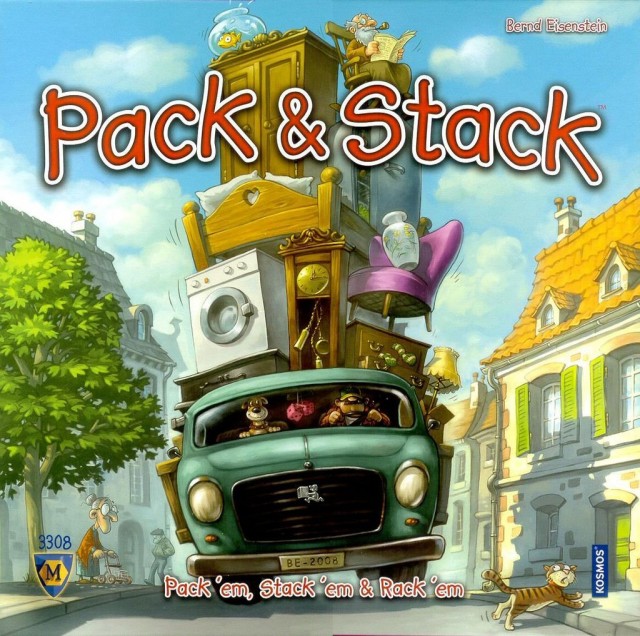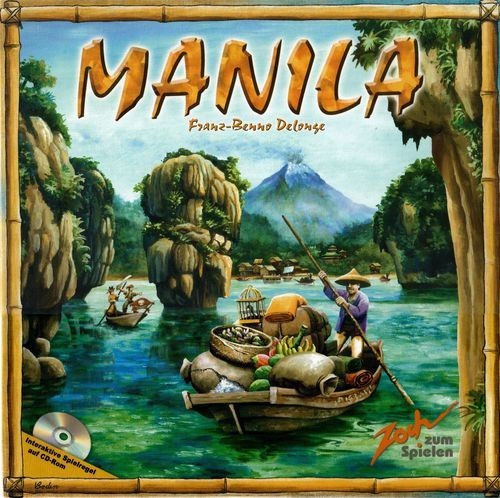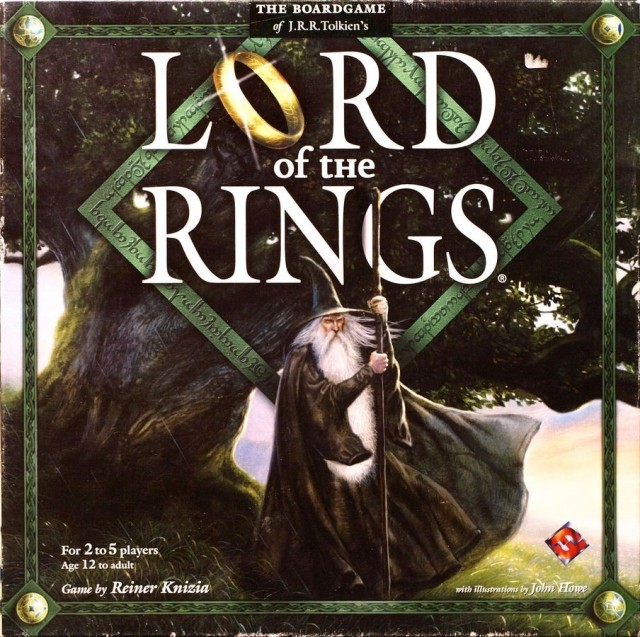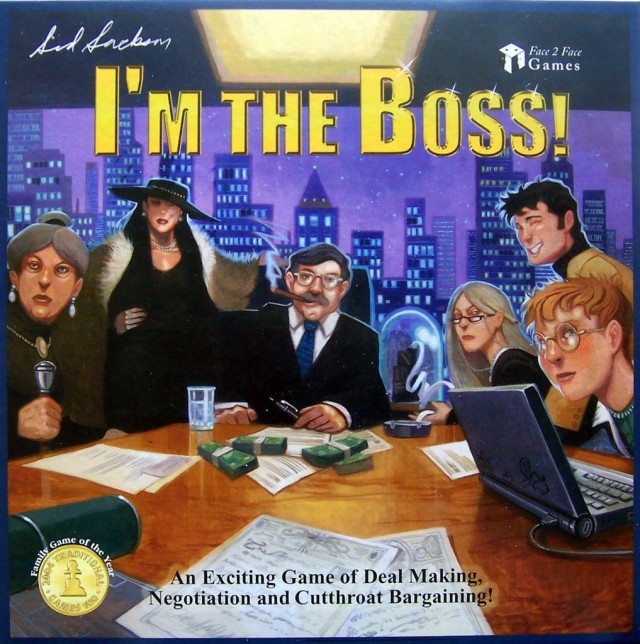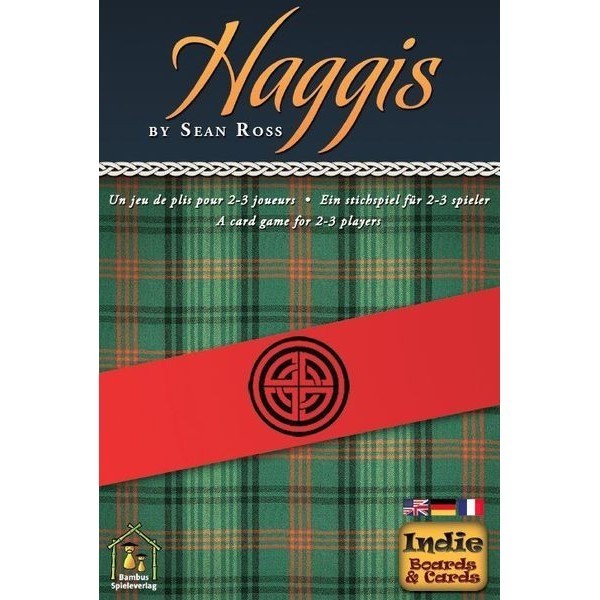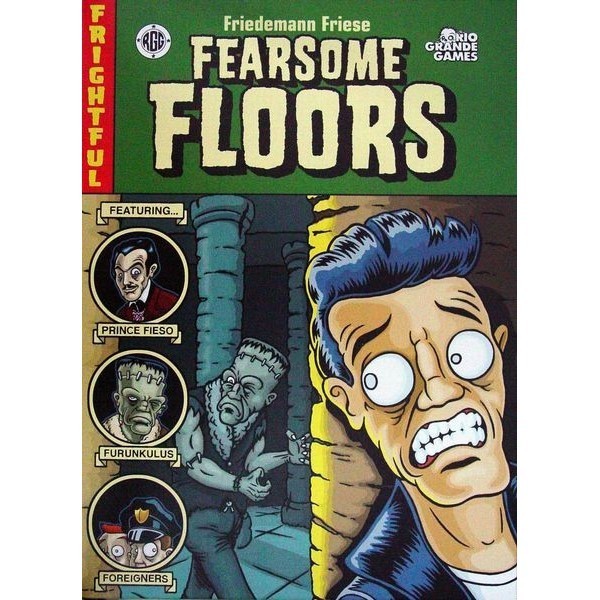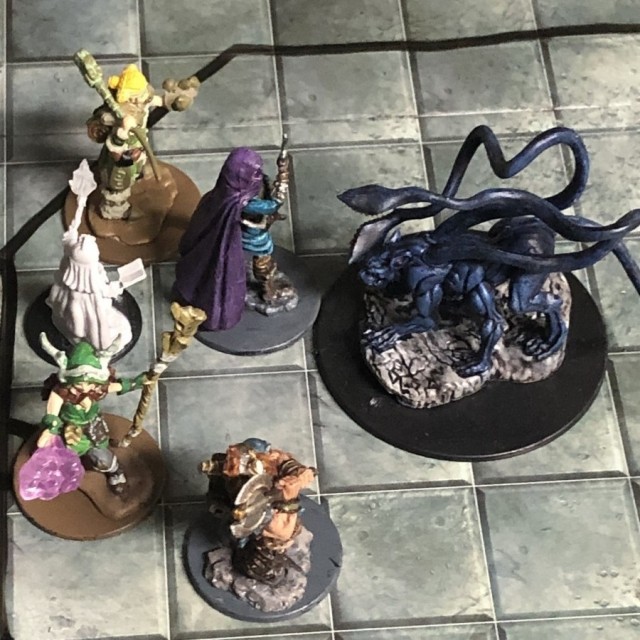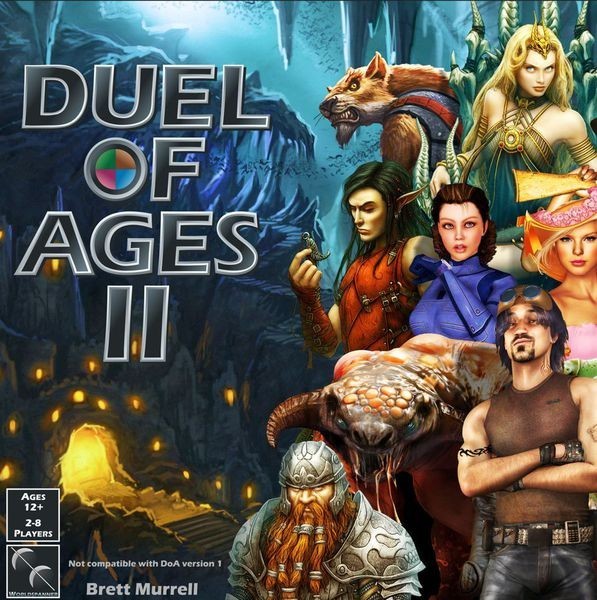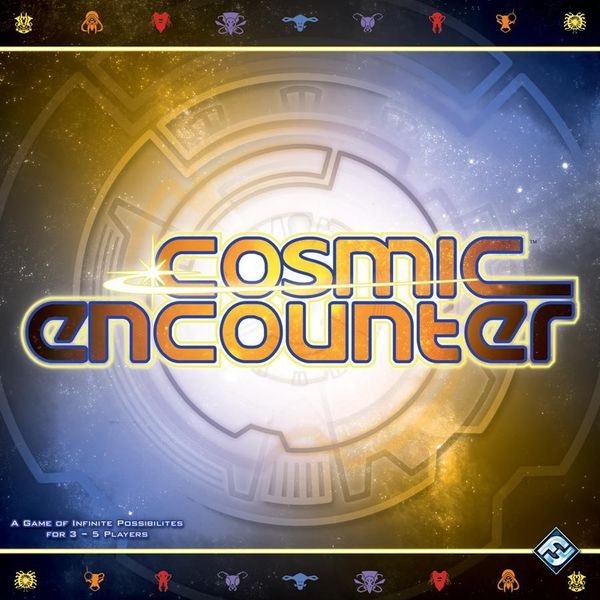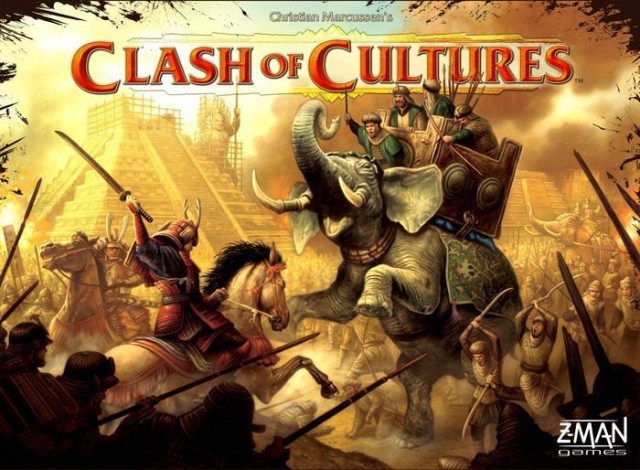Hello once again, and welcome back to the column that cooks you grits and gravy...but none for you, Higgins!
And Just Like The Movies...We Play Out, Our Last Scene
 So yeah, we didn't get a chance to see the new Pirates movie this weekend, so I really can't tell you anything about it. It made $90 million, which is a nice chunk of cash but still below industry estimates. It's also sitting at 33% fresh at Rottentomatoes.com...not a terribly good sign.
So yeah, we didn't get a chance to see the new Pirates movie this weekend, so I really can't tell you anything about it. It made $90 million, which is a nice chunk of cash but still below industry estimates. It's also sitting at 33% fresh at Rottentomatoes.com...not a terribly good sign.
Sucker Punch is at the local $1 theater, so I'll probably bite the bullet and try and catch that one before it's gone. Man, did that one land with a thud or what?
They've released an image of Tom Hardy as Bane. He looks pretty awesome from what little you can make out in the photo. Here's a look (credit: TheDarkKnightRises.com):
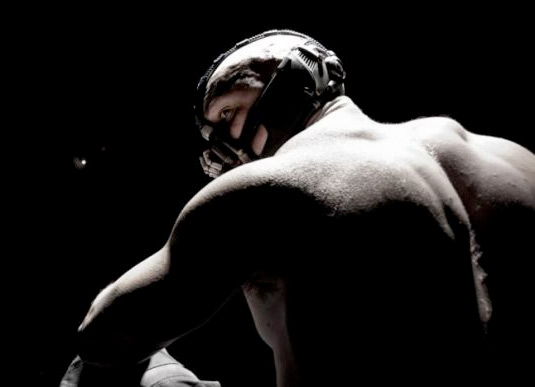
Personally, I miss the little chaffeur hat
In Nolan we trust. So long as the series doesn't pull an X3 or Spider-Man 3, I think we're in for another treat. Will it be the box-office dynamo that the Heath Ledger-infused The Dark Knight was? I doubt it, but I still think we're in for another great movie. We'll see.
Hangover II is out this weekend. I thought the first one was hilarious but I don't know, this one isn't inspiring me in the least. The trailers have been lackluster and you get the feeling of, "You guys blacked out AGAIN?"
No doubt it will make serious bucks over the Memorial Day weekend. If they're going to make a real franchise out of this though, they're going to have to come up with different scenarios. "Okay, how did you guys get drugged THIS time?" The movie promises more hilarious cameos and just in general ramping up the antics of the first one, times 2, or to 11, or whatever. All I ask is fewer--or more--pictures of people's junk in elevators. Is that too much to ask?

Zack Gafilackinarfikilikiss meditates
on his imminent overexposure
June 3rd sees X-Men: First Class as the major hitter. Unlike Hangover II, my interest in this has increased with each trailer and photo I see. With a talented director (Matthew Vaughan) at the helm, this one might turn out to be pretty damned good. If so, we'll just have to see if they keep dipping in the "Origins" well, if they reboot entirely, or if they have the balls to try and salvage the mess that X3 left behind. The X-Men series was once a box-office behemoth and the crown in Marvel's film cannon, so it would be nice to see things get back on track.
Have you ever noticed that comic book films are stuck in the 90s? Like, unless a comic was specifically created after that time, everything in comic movies are tied in to 80s and 90s continuity. Nick Fury as played by Samuel Jackson seems to be the only exception...but think about it; every major film, from Iron Man to Spider-Man to The Incredible Hulk to yes, X-Men and The Dark Knight have all been rooted firmly in continuity from the 90s. No Civil War, no female Robin, the X-Men cast is straight outta Lee and Claremont's early 90s run...anyway, just a curious thought.
We're Watching Survivor, and I'm Making Fun of Everyone
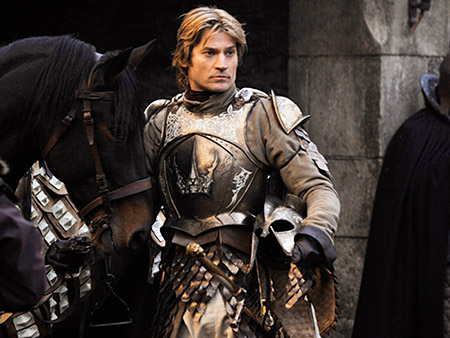 My wife and I got all caught up with Game of Thrones in time to watch Sunday's sixth episode. I don't want to give away spoilers as I know there are those that haven't read the books yet or those who will be catching up on the series later through DVR or DVD. I will have to say that they've made some gripping television, one of the best series I've seen on TV in years. I know the source material is strong, but the whole production--from acting to sets to dialogue to plotting--is top notch.
My wife and I got all caught up with Game of Thrones in time to watch Sunday's sixth episode. I don't want to give away spoilers as I know there are those that haven't read the books yet or those who will be catching up on the series later through DVR or DVD. I will have to say that they've made some gripping television, one of the best series I've seen on TV in years. I know the source material is strong, but the whole production--from acting to sets to dialogue to plotting--is top notch.
Seriously, once the series is done, it might be worth subscribing to HBO for a month just to get caught up with HBO On Demand.
I will say this--the end to episode 6 was brutal, but hideously comical in a twisted way.
The shit is *really* hitting the fan now, though. The next four episodes to wrap up this part of the series should be brutal and exciting. It is for me "can't miss television" and I haven't had that feeling for a new series in quite some time.
The ratings have been excellent; according to EW.com, the May 15th episode averaged 2.6 million viewers. Not too shabby for a subscription channel.
Now the REALLY curious thing is...why in the the old gods' names can't you buy Fantasy Flight's A Game of Thrones or its expansions? I really, really need Storm of Swords and you can't find it anywhere, not without paying an arm and a leg for it.
Say, you mugs should totally chip in and get me one for my birthday. I mean, my birthday's in September, but why wait? Beat the rush!
Ahem.
Snakes and Ladders, the Game Has Started...Roll The Dice, Take That Chance
That's as good a transition to talking about games as it's going to get this week, I'm afraid--yes, shameless, craven appeals for early birthday presents.
Top Race
Those who know my brother and I know that we're big fans of racing games. I've written in the past about my love for sports games in general, and it isn't hard to see why--sports games (or at least the good ones) must adhere to their theme, and there is a natural narrative that evolves from the simulation of any sporting contest.
sports games in general, and it isn't hard to see why--sports games (or at least the good ones) must adhere to their theme, and there is a natural narrative that evolves from the simulation of any sporting contest.
At any rate, he'd gotten a copy of Top Race (Wolfgang Kramer, multiple publishers, 2-6 players, 1 hour) a few months ago. Top Race is one of Wolfgang Kramer's racing trilogy that includes Detroit Cleveland Grand Prix and Daytona 500. For those unfamiliar with this series, it involves being dealt a hand of cards and then bidding on which car(s) you want to "own" for the coming race. The order that the cars finish will grant the players payouts.
What I like about the series is that most cards don't move only one car but several at a time, giving the game a feel of simultaneous action that's missing in a lot of racing games that have cars moving one per turn. The real trick of these cards is of course that many of them will be moving your rivals cars as well. With crafty play, you can zip yours to the front of the pack, and then block or make suboptimal moves with your opponent's cars to keep them to the rear of the pack.
Each of these three games brings something different to the table. Daytona has its drafting rules and a wide open course that you will absolutely need help from your opponents cards to make it through. Detroit Cleveland Grand Prix is vicious as its double-sided board features two tracks chock full of choke points and blocking opportunities, making it the meanest and least forgiving of the three. Top Race however takes the betting beyond the initial bidding for cars and allows players to make secret bets at certain, specific points along the race track. The earliest bets have a mammoth payout with little downside, while the late bets have a much smaller payout but with larger consequences for betting poorly.
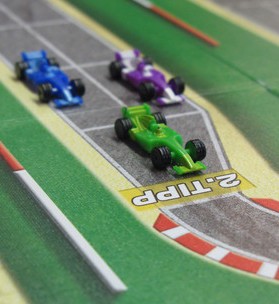 I should take a moment to note here that the betting in Top Race is listed as a "variant", but you absolutely shouldn't play without it. Even your first race. It totally makes the game. In the other two games, you're truly only interested in the cars you bid on. If you do help your opponents, it's grudgingly, or it's because you need to keep a rival down who threatens you during a series of races.
I should take a moment to note here that the betting in Top Race is listed as a "variant", but you absolutely shouldn't play without it. Even your first race. It totally makes the game. In the other two games, you're truly only interested in the cars you bid on. If you do help your opponents, it's grudgingly, or it's because you need to keep a rival down who threatens you during a series of races.
In Top Race though, everyone is interested in the race until the very end. It adds an extra dimension to which cars you move, and when. You not only have your own car and winnings to worry about, but also the placement of other cars in the race. Even with a spot of bad luck, if you won a car with a cheap enough bid, you can make up for a lot of bad luck by making shrewd bets and helping that opponent win the race.
We played it a few times and really enjoyed it, but then I found out about the Pegasus Spiele edition. I hunted down a trade for it and found one in shrink (it's distrubing how many BGGers have shrink-wrapped games lying around.)
Wow...I'm glad I did.
First up, the production on the Pegasus Spiele is insanely good. You get pre-painted cars, a nicer box, cardboard tokens for bidding instead of paper sheets, but best of all the game comes with two reversible mounted game boards, for a total of four different races in all.
Each race has a different flavor. There's the regular version's "Speed Street", a track with a couple of nifty choke points and has very much a Formula 1 feel to it. "Desert Drive" is a long road course through the desert that doesn't form a loop, and the lanes remain narrow pretty much througout. "Lake Lane" is another course with a Formula 1 feel, but has a much longer narrow section for tripping up your foes. Last but not least is Turbo Town, a track that loops in and around itself and is longer than a normal track, meaning you'll need to play extremely carefully or use the additional Pit Stop rules.
All the classic gameplay is here, but now there's a few more variants. The Pit Stop variant is one that allows you to take cards from a face up display by burning one of your three Pit Stop cards. This can help you scoop up a key card in a pinch. Then there's the Stock variant, where throughout a race you'll be buying and selling shares of each race color, and they get a payout at the end based on how they finish and how many shares you own of that color. I haven't had the chance to play this mode, but it would certainly lend a much different flavor, as you stop identifying with one car and start to see yourself as a portfolio manager--albeit one on the seedy side of betting on race cars, mind you.
One caveat, the Pegasus Spiele version is entirely in German, but to play the game the only thing you need are English rules, availabe on Boardgamegeek here: http://boardgamegeek.com/filepage/40861/fully-formatted-english-rules-for-pegasus-version
With four tracks and several ways to play, this one is probably going to take the crown in terms of my favorite racing games. It's a gorgeously produced game with betting, screw-your-rivals cardplay, and a lot of action. BIG time thumbs up from me on this one.
I've looked around online and while a few retailers had it in stock a couple of months ago, now the only one I can find is at Boards&Bits here: http://www.boardsandbits.com/product_info.php?products_id=22409 (This is not meant to be a plug for them, but it's a great game and if you're interested in getting a copy of this version, this is the only U.S. retailer I can find right now that has it.)
Drink All Day, Play All Night
One of my favorite types of 'casual' games is the trick-taking/ladder-climbing game. I know that they're not everyone's cup of tea, but they're great for getting together with a few friends, dealing some cards, shooting the shit, and cursing as someone takes a trick that you just *knew* you had won.

"Trick-taking?" See what I did there?
The goal of these types of games is to try and win 'tricks', either alone or with the help of a partner. Many of these tricks will have varying worth based on "point cards" that are present in each trick. The goal is often to win as many points as possible over a series of hands, often for the person or team who first reaches a predetermined point goal.
With that in mind, I thought I'd give you a short tour with some mini-reviews of a few of these types of games that I've played.
Hearts: Everyone knows Hearts as it's played with a standard deck of cards and just so happens to be installed on 99% of Windows computers.
Hearts has always been one that's interesting to me because unlike a lot of these types of games, you don't actually want to win any points. It was hilarious the first time I fired up Hearts on my computer years ago...I'm taking trick after trick, going "Man, I am RACKING up the points here! Haw haw!" Then I find out that, um, I lost when I reached 100 points. Whoops.
The game is especially tricky as the Queen of Spades is a nasty card worth 13 points to the person unlucky enough to take it. Most of a hand of Hearts is spent trying to fish for the Queen of Spades by forcing other players to follow suit and play it when they don't want it.
A common theme in these games is the notion of "following suit." If a suit is lead and you have it, you must play a card of that suit.
However, if you *don't* have any cards of that suit, you're free to play whatever you'd like. Nothing will make another player scream in frustration as when they lead a five of clubs and you drop the Queen of Spades on there like a bomb.
The last little rule about Hearts is that if you can take every point card in the hand, you score 0 and all other players score 26. And nothing will make YOU scream in frustration than when you take every trick, every heart...except the last one that someone sneaks in and takes as one of the last tricks, leaving you gorged on a bunch of points you didn't want.
Hearts is definitely one to play with a few beers. Since you're not in a partnership, the laughs and curses will flow quickly as all players jockey not to take any of those damned hearts.
Rook: Rook on the other hand is definitely one best played as a partnership game. The goal of Rook is like most other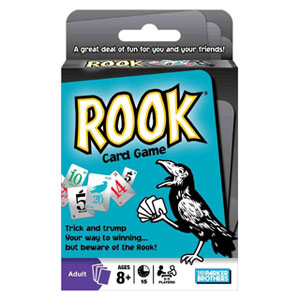 trick-taking games, in that you want to win as many tricks as possible, particularly those containing point cards.
trick-taking games, in that you want to win as many tricks as possible, particularly those containing point cards.
Now, the rules for playing Rook can vary a great deal; I have read probably a dozen or so variants for how to play. The version I play is the one my father taught me--you use the 1s of each suit as the highest cards in those suits, they're worth 15 points each, and they're all trumped by the Rook card. (If anyone knows the 'official' name for this method of play, please let me know. I thought it was Kentucky but there are a few differences from that, I think.)
In the version we play, you form two partnerships, each partner sitting across from each other at the table. For each hand, all players are dealt an even number of cards, and 5 cards are dealt to a small kitty called "The Widow." The top card of the Widow is turned face up, and bidding begins.
What you're bidding on is how many points you think your partner and yourself can take, and by winning the bet you get to declare which color is "trump", or the king color for that hand. The winner of the bid will also get to take the Widow, customize their hand and replace whichever five cards they want face-down to the Widow. It's important to bid well if you're strong, as calling trumps is very important, but note that if you don't make the amount of points you declare, you will be "set", or score nothing for your tricks that hand and instead get a negative score for what you bid.
Bidding is half the game in Rook. Decks in our games have 180 points total, with 5s being worth 5 points, 10s and 14s worth 10, 1s worth 15, and the Rook is worth 20. The Rook is the big bomb, so if you don't have him and you want to make your bid, you'll be trying to fish him out ASAP and minimize the late game damage he can do.
I admit to having a ton of nostalgia for this game due to playing it with my dad, but truth is its probably my favorite trick-taking game. You can often find us busting this out at family gatherings, and it will likely be a staple for years to come.
Tichu: I bought a copy of Tichu on the cheap, just to hear what all the hype was about. To some, Tichu is the second coming, the be-all and end-all of trick taking games, yadda yadda yadda.
 Having played it, I can admit that it's a good game, but it isn't worth all the fanatical devotion, and it certainly isn't "the greatest card game of all time." It is, however, really, really good.
Having played it, I can admit that it's a good game, but it isn't worth all the fanatical devotion, and it certainly isn't "the greatest card game of all time." It is, however, really, really good.
Tichu comes in an affordable little package. The cards are basically the same as standard playing cards, with the exception of the fact that the suits are different (Jade, Sword, Pagoda, and Star). Like Rook, Tichu is a partnership game where players will try to accumulate a certain number of points over the course of several games.
They do this by getting rid of their cards and taking tricks. Unlike Rook or Hearts where a single card leads, a player can lead what are essentially Poker hands. In fact, the best way to describe Tichu in my mind's eye is to say it is The Great Dalmuti mixed with Poker.
What makes Tichu a ladder-climbing game is that you have multiple opportunities to play in response to what was lead. You are limited to playing the same sort of cards as what was initially played. So if an opponent plays a three-of-a-kind, you can only play a higher-valued three-of-a-kind.
The special cards in Tichu are four, instead of only one as in Rook. The Mah Jong is like the two of clubs in Hearts, the player who has it must lead first, and it is a single card of value "1" that beats no other cards. A player with the Mah Jong is not obligated to lead with it, but saving it until later means that player has a very weak card in hand and it must be dealt with eventually. The Dragon is much like The Rook, with a twist--it is the highest single card, but winning a trick with the Dragon will force you to give the trick to your opponents. Definitely a gotcha for Rook players, timing the play of the big Dragon can be difficult to learn.
The other two cards have no analogue in either Rook or Hearts. The Dog has no numeric value, and can only be played to lead--but once played, the lead immediately passes to your partner. Last up is the Phoenix, which can either be a wild card, or as .5 higher than the last card played. Watch out, though--the Dragon is worth a negative 25 points to the team who has it in their possession at the end of the hand. More on that in a minute.
There is something called a "Bomb", and these are probably the key to Tichu. Bombs are the most powerful Poker hands--four-of-a-kind or a straight flush of at least five cards. Bombs can be played completely out of sequence and can only be beaten by a higher bomb. Games are pretty much won and lost on the timely play of a powerful bomb, and getting counter-bombed is often enough to wreck the entire hand.
Each hand has players passing cards, one to each player. There's no table talk allowed, so you have to look hard at your hand of cards and try and figure out what will help your partner the most. Likewise, you'll want to give junk to your opponents, to gum them up and slow them down.
From there, players take turn leading sets or straights, with other players countering, until one team or another is out of cards. Scoring is based on the points in the tricks taken, as well as "Tichu" bets (a player can take a bet that their team will be first to go out.) The last player gives their hand cards to the opposing team and all tricks won by them to the first player out.
What that means is you can worm your way into giving away the Phoenix, or even better, reclaiming that Dragon's 25 points because you went out and your opponent had to give you their tricks.
I like Tichu, but it's definitely at the threshold of casual gaming. I made the mistake of describing the game as "Dalmuti meets Poker"--both games he really likes--but didn't take into account that he would be confused by not being able to play higher poker hands against what was lead (i.e., you lead a pair, he wanted to play three of a kind to beat it.) This mix-up soured him on the game almost immediately. It's hard to get a second chance with some games, so just be careful how you teach it.
It's dense and merits study, but it's probably best played as a game you don't overthink and just have fun with. Get too serious with it, and forget bringing it to a casual family gathering.
Haggis: I was sent Haggis (Sean Ross, 2-3 players, 45 minutes) for review by Travis at Indie Boards and Cards. When I started studying up about it and realized it was a version of Tichu without some of the added complexities and with a 2-player version, I was chomping at the bit to give it a try.

"What part of Spain did you say you were from? Scotland?"
2-player trick-taking games are usually flawed. They're either total guesswork because you leave a part of the pool out, or total luck because of "dummy players" flipping cards out randomly, or perfect information means that you follow a script until the hand is complete.
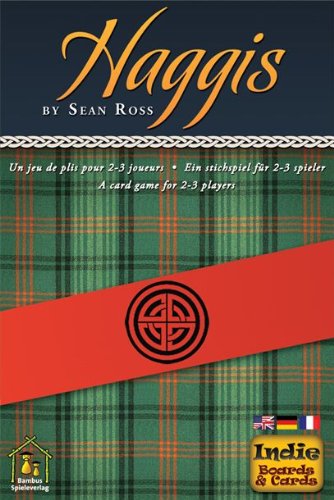 Haggis avoids all of those pitfalls, and although we've only played about a dozen hands of it, I have to say I really, really like it. It's a great, affordable card game in a compact, travel-friendly package. And did I mention it does two-player trick taking well?
Haggis avoids all of those pitfalls, and although we've only played about a dozen hands of it, I have to say I really, really like it. It's a great, affordable card game in a compact, travel-friendly package. And did I mention it does two-player trick taking well?
It's a lot like Tichu, with several twists. The notion of leading sets or straights is the same, but you are more limited by suits especially. Two-pair not only have to be in sequential order, but each must be a pair of the same two suits. Also, each player starts with a Jack, Queen, and King in front of them. These are wild cards that may also be used in certain combinations as bombs.
The point cards in Haggis are the 3s, 5s, 7s, and 9s (all worth 1 point each); and the Jack, Queen, and King, worth 2, 3, and 5 respectively. Like Tichu, should you choose to use a bomb combination, your opponent takes the cards in the trick, even though you 'win' the trick and the opportunity to lead. That means the next-to-strongest bomb is the Jack, Queen, and King--but win a trick that way and you hand your opponent 10 points plus whatever else was in the trick.
The 3s, 5s, 7s and 9s are further special because they can also be combined to make bombs. If you have one of each in different suits, that is the weakest bomb; good enough to take any trick, but beaten by all other J/Q/K combination bombs. However, if you're lucky enough to get 3,5,7, and 9 in one suit, you've got the biggest bomb there is. And it only gives away 4 points (1 point for each of the point cards.)
Games of Haggis are fast-paced and filled with tough decisions. You need the lead, but your opponent Jack-Queen bombs the trick. You could go one up with a Queen/King, but not only do you lose access to your most powerful bomb, you're losing those points he's offering while also tossing in another 8 points. When you go out you score 5 points per card left in your opponent's hand, so you can just sit on your cards and wait, or the hand will be over in a blink and your opponent will be scoring 20-30 points on your leftovers. The last player gets the Haggis, or a set number of cards that were placed aside at the start of each hand. Any point cards found there are also ripe for the pickings of the winner.
bombs the trick. You could go one up with a Queen/King, but not only do you lose access to your most powerful bomb, you're losing those points he's offering while also tossing in another 8 points. When you go out you score 5 points per card left in your opponent's hand, so you can just sit on your cards and wait, or the hand will be over in a blink and your opponent will be scoring 20-30 points on your leftovers. The last player gets the Haggis, or a set number of cards that were placed aside at the start of each hand. Any point cards found there are also ripe for the pickings of the winner.
It's a great game with some nice strategy that is perfect for 2-3 players. Great for couples who like their games a little meaner and more direct than Lost Cities. Just be prepared to spend the first few games trying to learn the tempo, because it will be faster than you're used to.
I've really enjoyed both of Indie's games I've played, this and The Resistance. I want to get a copy of Triumvirate, which is also a 2-player trick taking game that supposedly works. Having tried this one, I'm convinced.
 Myth: Pantheons: The last of the trick-taking games on my list this week is certainly the most complex and thematic, and that's Myth: Pantheons (Brent Keith, AEG, 3-6 players, 45 minutes). It takes the standard trick-taking forumla and layers on a theme about Gods doing battle to claim possession of the greatest cities of the mortals.
Myth: Pantheons: The last of the trick-taking games on my list this week is certainly the most complex and thematic, and that's Myth: Pantheons (Brent Keith, AEG, 3-6 players, 45 minutes). It takes the standard trick-taking forumla and layers on a theme about Gods doing battle to claim possession of the greatest cities of the mortals.
To do this, you have a deck of five suits--the game calls them domains (Harvest, Weather, Heavens, Death, and War.) Each player takes on the role of one of 12 gods across several different mythologies. Some of the gods available are Thor, Guan Yin, White Buffalo Woman, Anansi, and Jupiter. Each of these gods have a special power that they can use to their advantage during the game. The Morrigan focuses on Death and War, and if all cards played in a "Challenge" (read: trick) are Death or War, she may draw a Mortal card. Ganesh can play his deity cards no matter what leads.
What are deity cards, you ask? Not only does each god have an ability, but also five very powerful Deity cards at their disposal. I love this part of the game because, as in Puzzle Strike, you get to pit asymmetrical powers against one another, lending an identity and theme to each conflict.
Instead of just playing trick after trick to earn points, players are doing battle over city cards. City cards include some of the most famous cities of mythologies, including Troy, Jericho, Babylon, and Athens. Each city has a "difficulty" to be won, and to claim a city, a player must have won as many tricks as listed since the last time a city was claimed. You track this by keeping cards in front of you.
The last bit of the game involves the tokens. There are a ton of little tokens in each of the domains, and you earn these by losing tricks (counter-intuitive, I know) or though the play of certain Deity or Mortal cards. These tokens allow you to take "Divine Acts" based on the tokens you spend. These allow you to do everything from pump up the value of a card played, protecting cities from disaster and plague (Prophesy) to straight up refueling your hand. It is a thinly-veiled catch-up mechanism, but it works.
All of this is cocooned around a fairly standard trick-taking game at its core. The "ruling domain" (trump) for the current city is determined at random at the start of an Epoch, players take turns leading, trying to win a certain number of tricks so that they can claim cities. Play continues during an Epoch until one player runs out of Mortal cards; that makes the currently contested city the last for this Epoch. Three Epochs and the game is through. By winning cities and by extensions followers, you're scoring the points to try and be the dominant god at game's end.
Like I said above, this is about as thematic as trick-taking games are going to get. I don't see how you could really layer any more onto this without it collapsing. As it is, you have a furious flurry of cards, powers, tokens, and divine powers that can make figuring out how to win all the cities difficult. But in that vein, it also means that you can sling cards and invoke powers, laughing mightily, and tally up your fickle followers at game's end. Ironically, it's a much more complex game, but its nature lends itself very well to casual players who are willing to take the plunge.
I do have a few problems with the production, though they are minor. The cards use Roman numerals in a tiny font for their values, which will slow the game down as players squint to see what has been played already. Also, there are a ton of little tokens, but nowhere to really put them in the box instead of dumping them in like a dog's breakfast. Unless you want to sort the different token types every game, you'll need to figure something else out.
The last issue is that the rulebook really doesn't say how you win! It's inferred that you win by having the most followers as you get followers equal to the value of a city when you win it, but as far as I can tell there is no sentence in there that says, "At game's end, the player with the most followers wins." Under Harvest tokens it describes their use as Followers, and how they're "needed to win the game", but one sentence saying "most followers = king god" would have been nice. Again, a minor complaint.
It's chaotic, messy, but thematic and asymmetrical. It is truly trick-taking in AT form.
I will mention the artwork...the art on the god cards is fantastic.
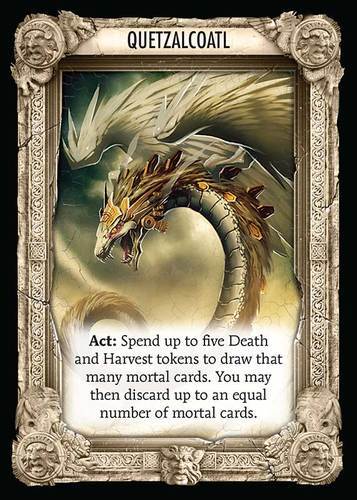
Alright folks, thanks for hanging tough and sticking through. Feel free to leave comments, suggestions, or complaints in the comments section. Until then, I'll see ya in seven.
 Games
Games How to resolve AdBlock issue?
How to resolve AdBlock issue? 


